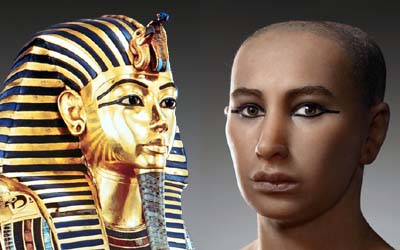
Photograph: Supreme Council of Antiquities, Egypt, and National Geographic Society, 2005
Based on an earlier CT Scan of the boy king's mummy, Paris-based forensic sculptor Elisabeth Daynès created a silicon-skinned bust using the previously acquired data and combined it with average traits of today's Egyptians. The CT data was then sent to a U.S. forensic team, who worked to verify the findings, without knowledge of who their subject was.
The reconstruction will be featured in the June issue of National Geographic, in the touring exhibit Tutankhamun and the Golden Age of the Pharaohs, and on the National Geographic Channel's upcoming special King Tut's Final Secrets.
You can read more about the reconstruction at scotsman.com, CNN.com, and The Washington Post Online.
Also recently in the news was a discovery that is considered to be "the most beautiful mummy ever found in Egypt," according to Dr. Zahi Hawass, the head of Egypt's Supreme Council of Antiquities. The nearly 2600 year-old mummy was buried in a wooden sarcophagus beneath 20 feet of sand in the necropolis of King Teti, who ruled Egypt more than 4,300 years ago. While the mummy's identity and sex are unknown, it's certain that it dates back to the 30th Dynasty (380-343 B.C.), which lasted about 40 years and marked the end of Egyptian rule over the country.
More photos can be viewed here, with further information available this Dicovery Channel link.
1 comment:
that skin tone is too bright and that bottom lip has been made smaller.
Post a Comment